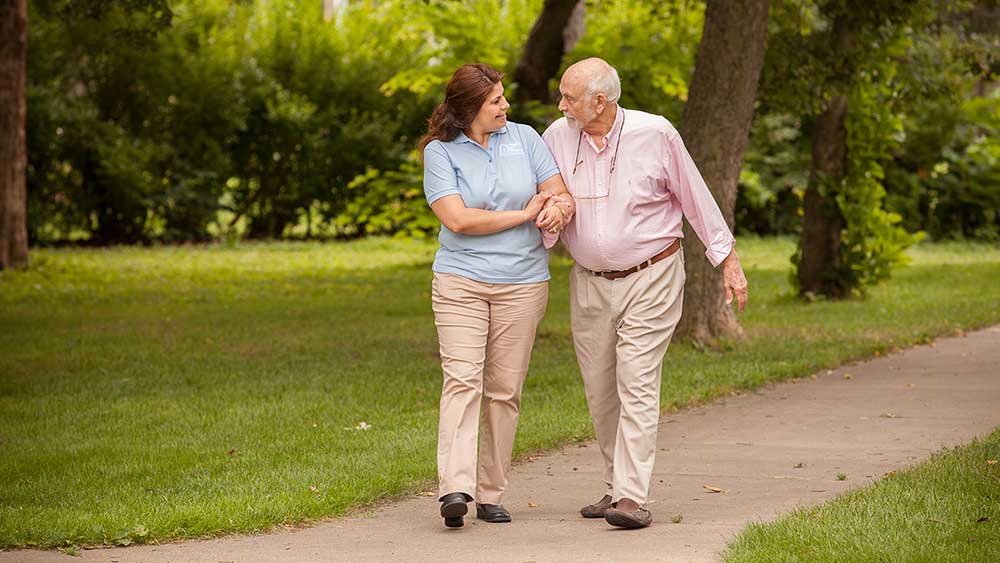

10 Frequently Asked Questions for Registered Dietitians
As a 20-year registered dietitian, Amy Mack fields a full menu of questions about food and the latest trending diets. As co-owner of the Right at Home office in Hudson Valley, New York, alongside her husband Scott Teresi, Amy understands the challenges of fueling the body as people age.
“Family caregivers can do some simple things to improve the nutrition of their senior loved ones,” says Amy, who is also a dietitian for a local medical center. “Sometimes it is as simple as cutting up fruit and putting it on a plate for the senior, or making sure there’s high-quality protein at each meal. Maintaining a senior’s hydration is essential along with providing fresh foods.”
Here, Amy shares her insights to 10 common questions about senior nutrition.
1. What are good sources of protein?
Eggs are a high-quality source of protein. They are soft and can be prepared many ways. There is cholesterol in eggs, but this cholesterol is not going to affect a person’s overall cholesterol as much as saturated fats and trans fats. Nuts are another good source of protein, but if a person has a chewing problem, you can incorporate nut butters into recipes instead. Fish, chicken and meat are excellent protein sources, and soy protein can sometimes be helpful for people who are willing to try it.
2. What are good and bad foods?
If you’re looking at improving true functional health, there really are no good or bad foods. Unless a person truly has to avoid some foods because of allergens or medical restrictions, I do not discourage certain foods. It’s always good to allow yourself to be realistic, and so much of nutrition is about moderation. Nutrition is like a marathon — you are always working at it.
3. How can fluids be added to a diet?
For seniors, always have a beverage at their side — all fluids count. Also provide foods with a high water content such as soups, smoothies, popsicles, and fruits like melons and grapes. Many fruits and vegetables contain 90 percent or more water. In winter, seniors can drink hot fluids like cocoa, coffee and tea. Having a caregiver present encouraging the senior to get enough liquids can make a big difference.
4. What about sugar-free or diet foods?
I advise steering away from processed, diet foods because they have a number of chemical additives. Some artificial sweeteners can cause intestinal cramping. Seniors rely on some processed foods like frozen dinners, but it is really important for their diet to include more of plain, fresh, unprocessed foods.
5. How can fiber be added to a senior’s diet?
The best way for seniors to get fiber is through plant-based foods and cereals. Some cereals are also fortified with iron and zinc. Seniors should eat whole grains as much as possible. If it’s hard to get fiber through these foods, there are fiber supplements, and even fiber Gummies® are now available. Adding ground flaxseeds or oatmeal to foods helps with fiber.
For foods richer in fiber, look for foods labeled with 5 grams or more of fiber per serving. When increasing fiber in a senior’s diet, always do so slowly with an increase in fluids to prevent abdominal distress.
6. How important is vitamin D?
The recommended vitamin D levels are usually not enough to boost people to a healthy level. Everyone should be taking a vitamin D supplement. Many of the multivitamins are starting to include more vitamin D. It is best to talk with a doctor about the amount of vitamin D a senior can safely add to their diet. Good vitamin D food sources include fish, eggs and fortified milk; however, you cannot get enough vitamin D in your diet alone.
7. What about medication and food interactions?
Always check with your doctor and pharmacist about how a specific medication interacts with food. For example, some leafy greens and foods high in vitamin K can affect blood thinners. If you are taking a blood thinner, you don’t need to avoid leafy green vegetables entirely — you just need to be consistent in your intake and not go overboard. Also, grapefruit can affect the absorption and metabolizing of certain drugs. Salt substitutes often replace salt with potassium and can decrease the effectiveness of medications for high blood pressure and congestive heart failure.
8. What kind of fat is OK to eat?
Fish, nuts and avocadoes are a healthier source of monounsaturated fats. You want to go lighter on the saturated fats in meats. Trans fats found in processed foods and fried foods are considered more harmful. Dairy has saturated fat in it, but I don’t tell people to avoid milk fat. I recommend being moderate with animal-based fats such as cheese.
9. What helps with a poor appetite?
When seniors are dealing with appetite issues caused by cancer treatments or surgery recovery, or just not wanting to eat, you may want to mix up the diet a bit. Some of the nutritional supplements such as Ensure® can be a benefit, but you don’t want to solely depend on them. You might want to add in some fruit, protein powder or ice cream. Caregivers can help with adding nutritional variety to a diet.
10. How do you deal with unintentional weight loss?
Calorie intake is an individual measure for each person, but if an elderly person loses 5 percent of his or her body weight in a month, that is significant. That fluctuation is a red flag and should be addressed by a doctor. With this type of unplanned weight loss, the person is at higher risk for getting sick and not healing well. There could be something else going on in the body. Weight monitoring is important for older loved ones, especially those with medical conditions such as congestive heart failure. Also, if you notice your loved one is gaining weight rapidly, this could be a sign of an underlying health condition.







